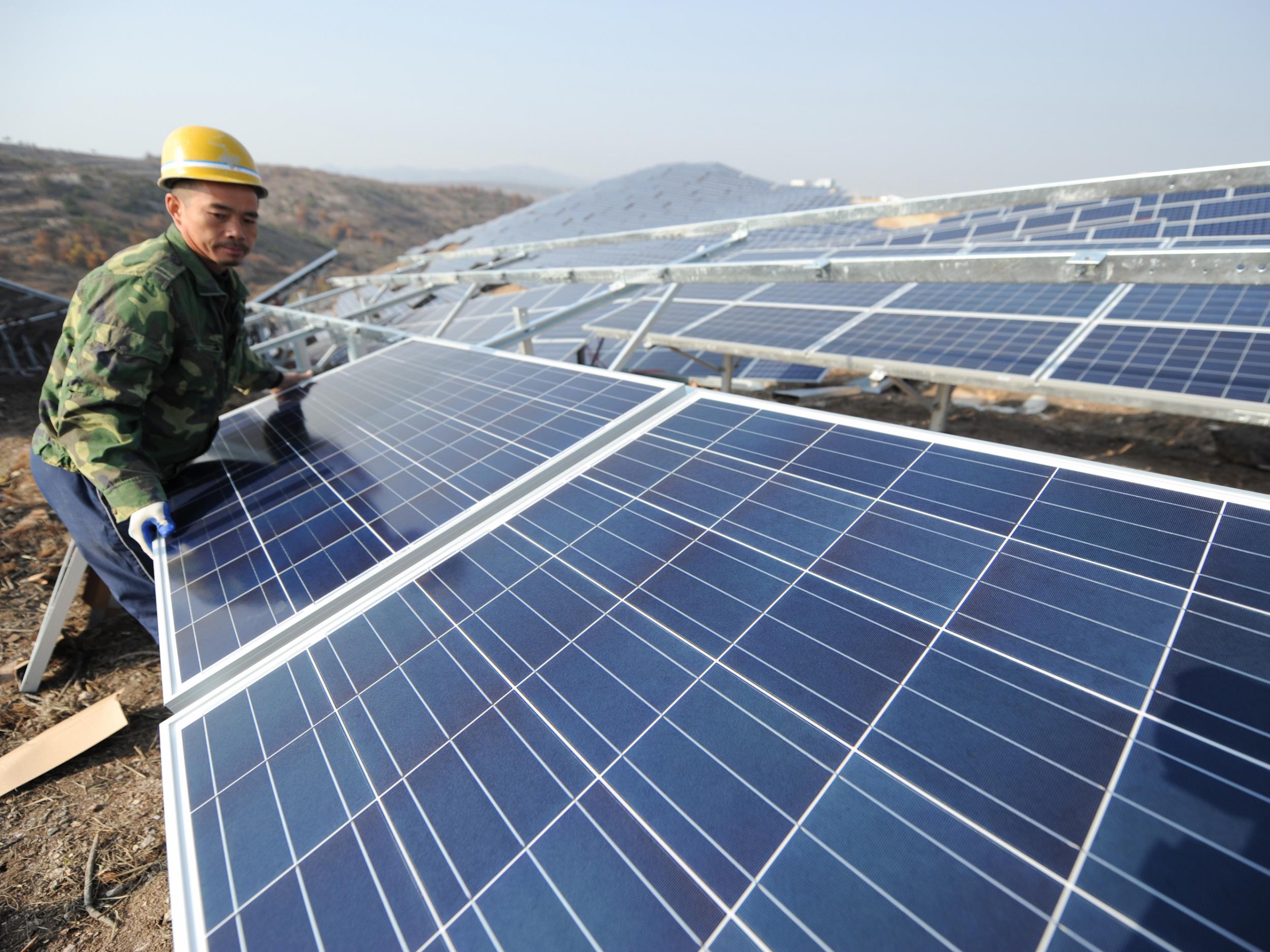World invested more in solar energy than coal, gas and nuclear combined in 2017, UN report reveals
New figures show ‘how much can be achieved when we commit to growth without harming the environment,’ says UN

Global investment in renewable energy shot up last year, far outstripping investment in fossil fuels, according to a UN report.
As the price of clean energy technology plummets, it has become an increasingly attractive prospect for world governments.
China was by far the world’s largest investor in renewable energy in 2017, accounting for nearly half of the new infrastructure commissioned.
This was mainly a result of its massive support for solar power, which globally attracted nearly a fifth more investment than in the previous year. Other countries including Australia, Sweden and Mexico more than doubled the amount of money they pumped into clean energy projects.
“Yet again, this was a record year for new renewable power capacity being financed,” Francoise d’Estais from UN Environment’s energy and climate branch told The Independent.
“We had a record 157 gigawatts commissioned last year, far outstripping the fossil fuel generating capacity, which we estimated as 70 gigawatts.”
In just over a decade, concerted investment has increased the proportion of world electricity generated by wind, solar and other renewable sources from around 5 per cent to 12 per cent.
The global replacement of traditional fuels with renewables led to around 1.8 gigatonnes of carbon dioxide emissions being avoided last year – the equivalent of removing the entire US transport system.
“The extraordinary surge in solar investment around the world shows how much can be achieved when we commit to growth without harming the environment,” said the head of UN Environment, Erik Solheim.
“By investing in renewables, countries can power new communities, improving the lives and livelihoods of the people who live in them, and at the same time cleaning up the air they breathe.”
As China’s electricity demands have risen rapidly, renewable energy has become an increasingly appealing prospect that has the added benefit of avoiding the toxic air pollution blighting many of the nation’s major cities.
“A dominant trend over the last couple of years has been the falling cost of renewables – wind but particularly also solar – and that has been important for China,” Professor Ulf Moslener, a sustainable energy expert at Frankfurt School of Finance and Management, told The Independent.
“In China there has also been a strong government push for increasing solar, and that was motivated not only by climate but also other environmental reasons.”
Besides revealing the leading lights in renewable energy investment, the report, commissioned by the UN in cooperation with Bloomberg New Energy Finance, also revealed that some major countries were falling behind.
“The growth globally in terms of investment hides the fact that there is strong growth in China, a slight decline in the US, and a considerably strong fall in investment in Europe – and that is strongly driven by Germany and the UK,” said Professor Moslener.
The UK has been performing well in clean energy generation, with recent figures showing wind and solar sources had overtaken nuclear as suppliers of electricity.
However, despite these positive trends, 2017 saw a big drop of 65 per cent in British renewables investment.
This is partly due to the timing of large projects being financed – there were several major offshore wind projects funded in 2016 and only one in 2017 – but here has also been a decline in government support.
10 photographs to show to anyone who doesn't believe in climate change
Show all 10“The government stopped offering subsidy support for onshore wind after the 2015 election,” Angus McCrone, the lead author of the report, told The Independent.
“For solar there was a big cutback in support as well.”
Experts have criticised the withdrawal of UK support for onshore wind, as previous analysis has demonstrated it already has the capacity to outcompete fossil fuels as a power source.
As renewable energy prices continue to fall, however, Professor Moslener said government subsidies are likely to become less and less important.
While the figures in the new report are encouraging from a global perspective, experts warned that there was still plenty of progress to be made.
“The world added more solar capacity than coal, gas and nuclear plants combined,” said Nils Stieglitz, president of the Frankfurt School of Finance and Management, which helped produce the report.
“This shows where we are heading, although the fact that renewables altogether are still far from providing the majority of electricity means that we still have a long way to go.”
Read more on solar panels
Subscribe to Independent Premium to bookmark this article
Want to bookmark your favourite articles and stories to read or reference later? Start your Independent Premium subscription today.

Join our commenting forum
Join thought-provoking conversations, follow other Independent readers and see their replies